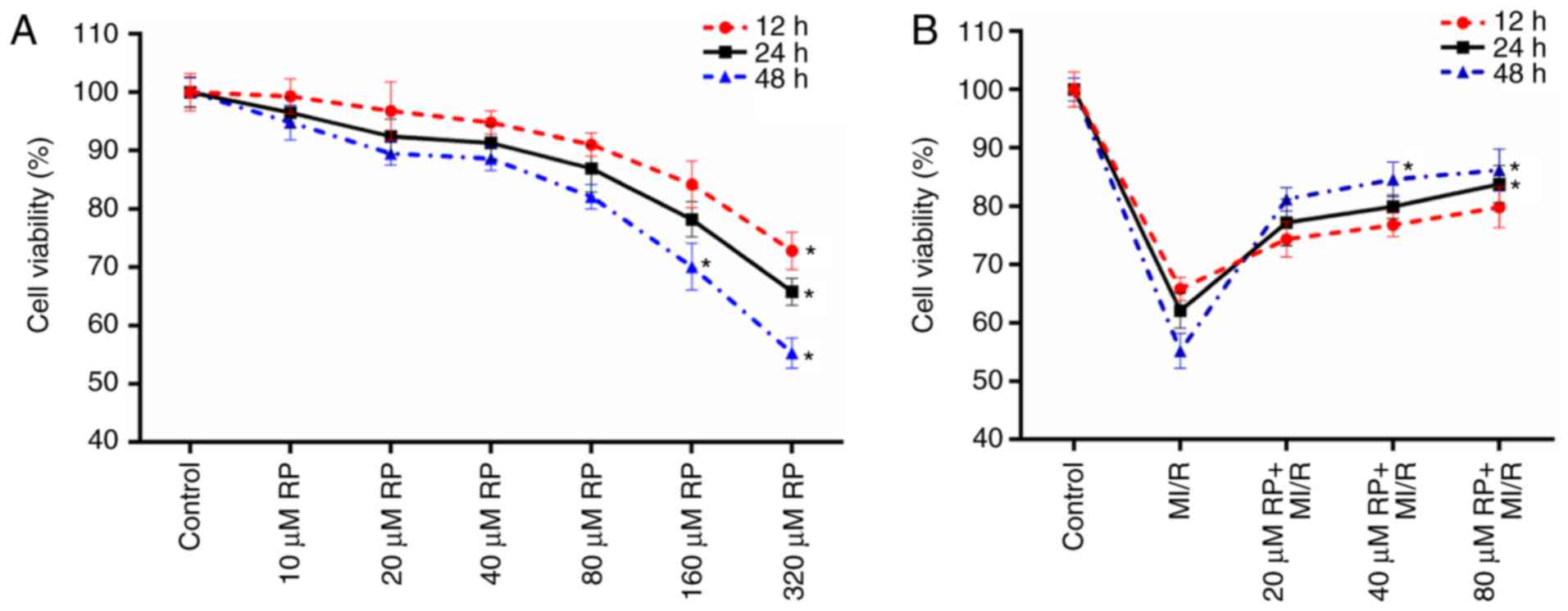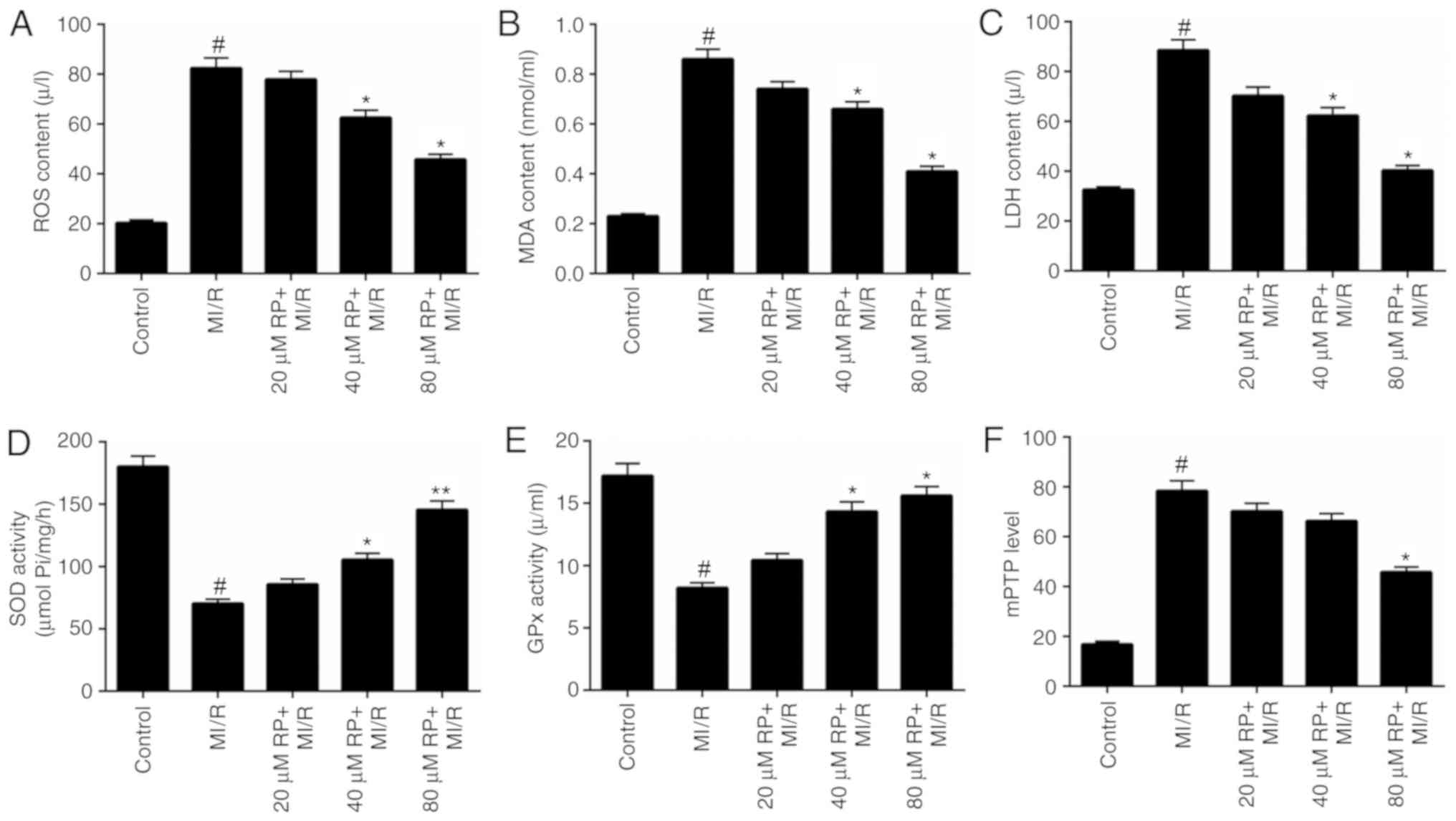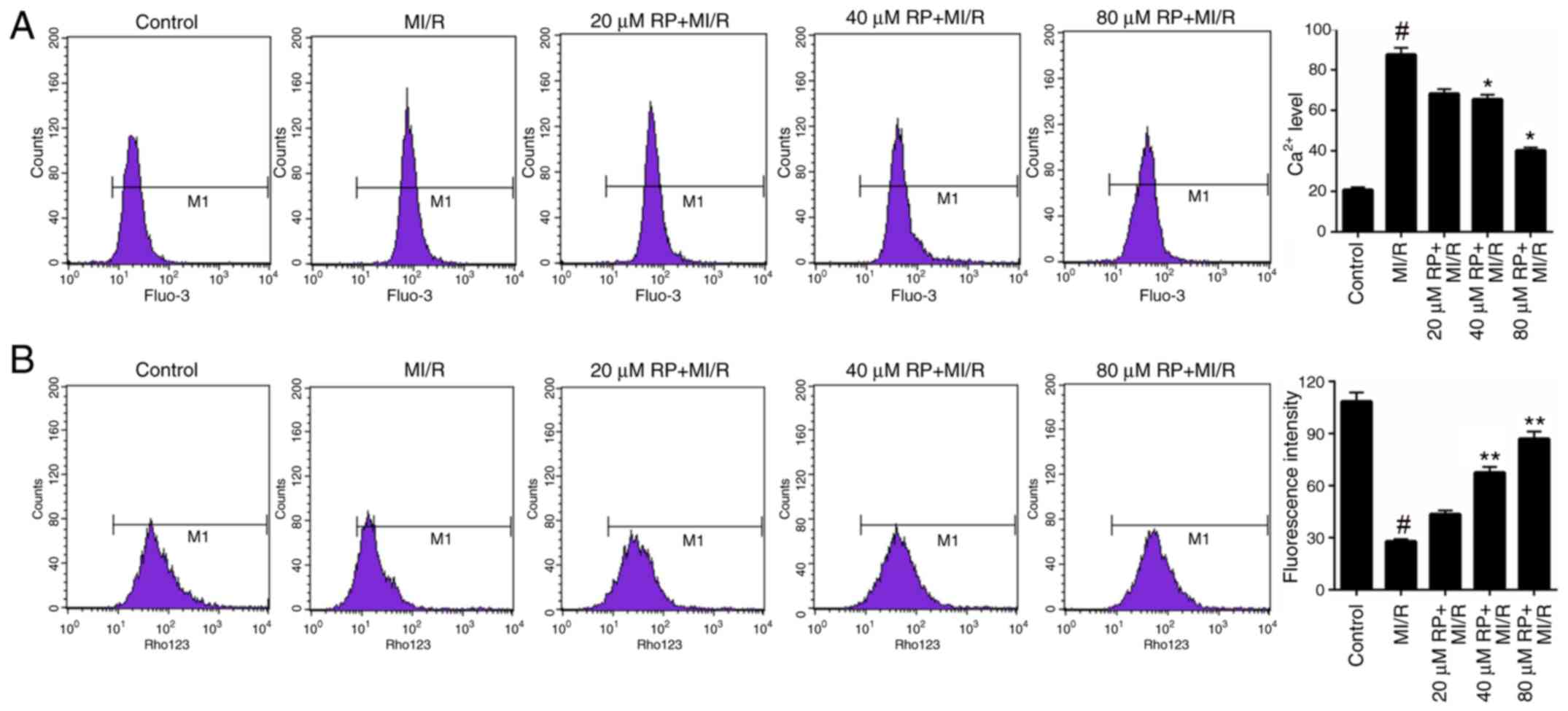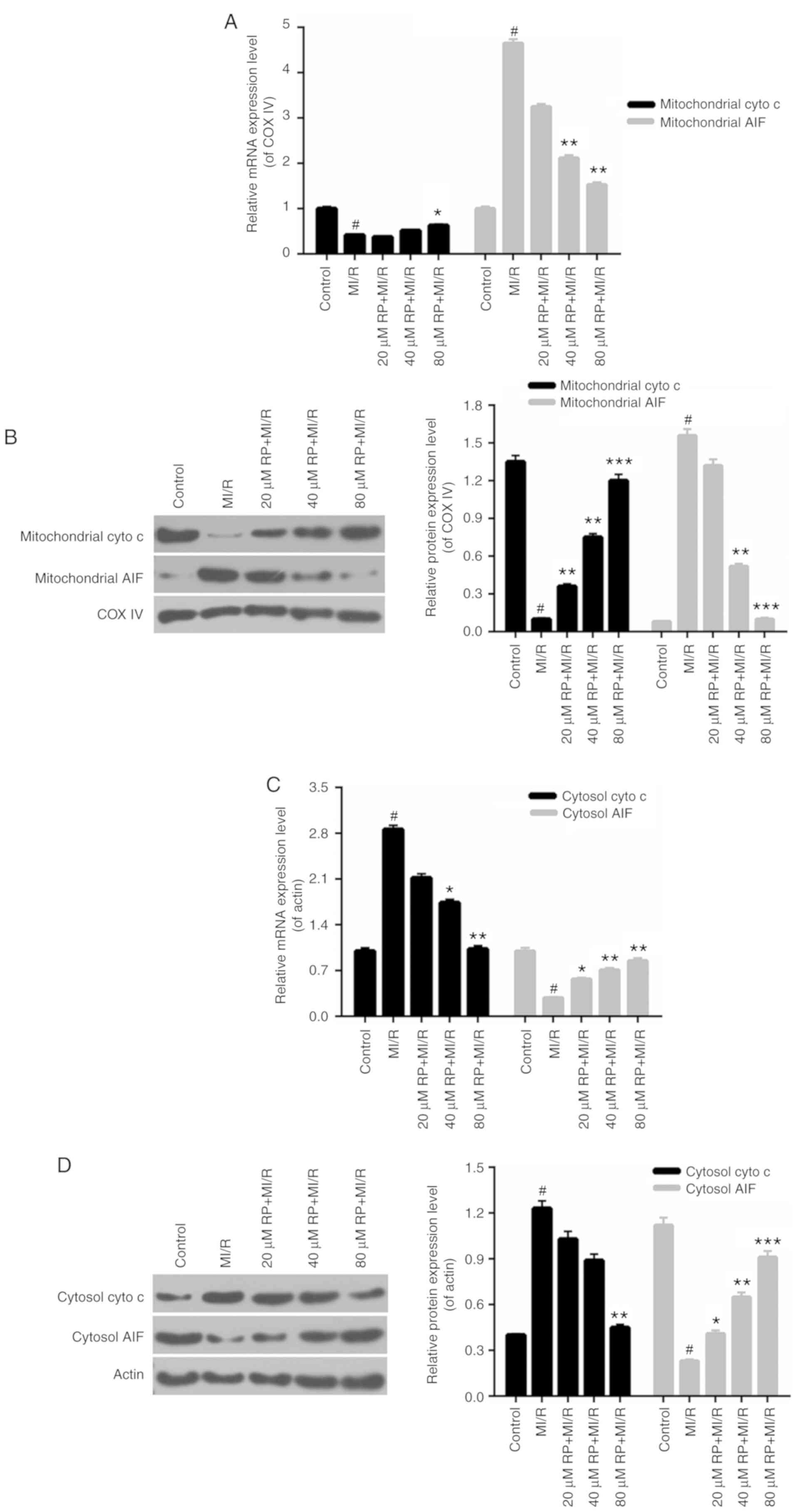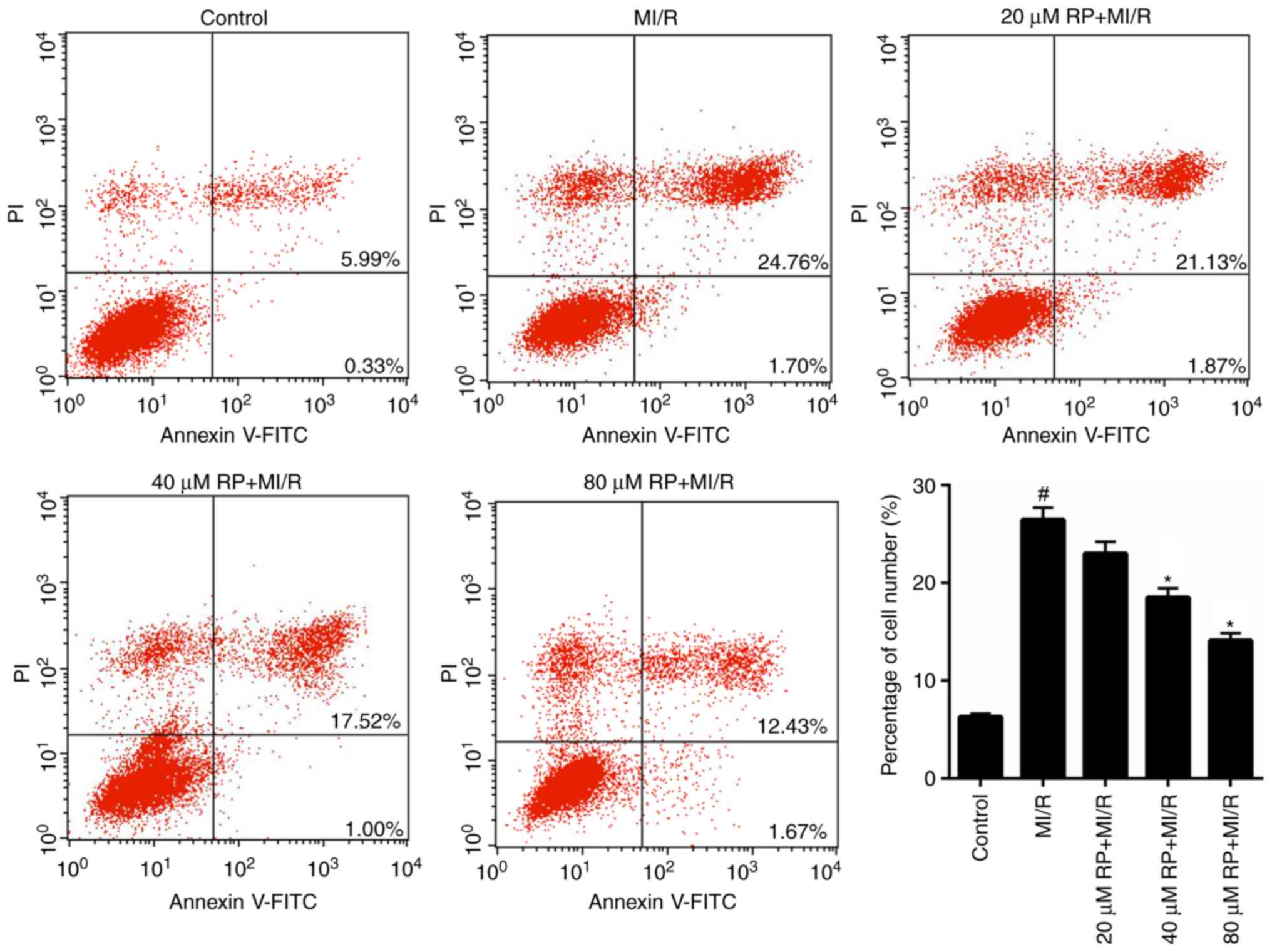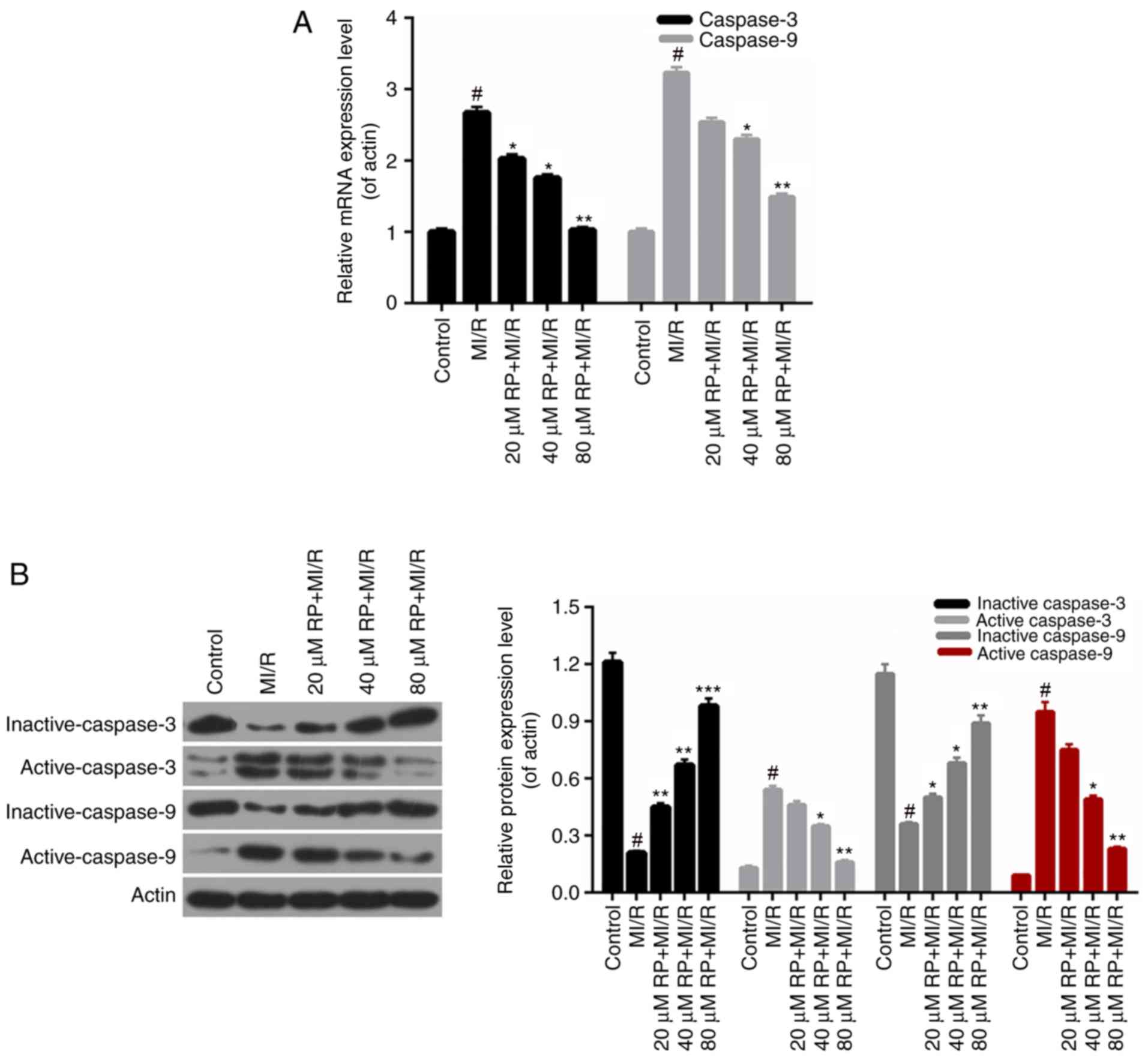|
1
|
McCullough PA: Coronary artery disease.
Clin J Am Soc Nephrol. 2:611–616. 2007. View Article : Google Scholar : PubMed/NCBI
|
|
2
|
Roger VL, Go AS, Lloyd-Jones DM, Adams RJ,
Berry JD, Brown TM, Carnethon MR, Dai S, De Simone G, Ford ES, et
al: Heart disease and stroke statistics-2011 update: A report from
the american heart association. Circulation. 123:e18–e209. 2011.
View Article : Google Scholar : PubMed/NCBI
|
|
3
|
GBD 2013 Mortality and Causes of Death
Collaborators: Global, regional, and national age-sex specific
all-cause and cause-specific mortality for 240 causes of death,
1990–2013: A systematic analysis for the Global Burden of Disease
Study 2013. Lancet. 385:117–171. 2015. View Article : Google Scholar : PubMed/NCBI
|
|
4
|
Rodriguez-Sinovas A, Abdallah Y, Piper HM
and Garcia-Dorado D: Reperfusion injury as a therapeutic challenge
in patients with acute myocardial infarction. Heart Fail Rev.
12:207–216. 2007. View Article : Google Scholar : PubMed/NCBI
|
|
5
|
Bolli R: Preconditioning: A paradigm shift
in the biology of myocardial ischemia. Am J Physiol Heart Circ
Physiol. 292:H19–H27. 2007. View Article : Google Scholar : PubMed/NCBI
|
|
6
|
Kitakaze M: How to mediate
cardioprotection in ischemic hearts-accumulated evidence of basic
research should translate to clinical medicine. Cardiovasc Drugs
Ther. 24:217–223. 2010. View Article : Google Scholar : PubMed/NCBI
|
|
7
|
Tissier R, Waintraub X, Couvreur N,
Gervais M, Bruneval P, Mandet C, Zini R, Enriquez B, Berdeaux A and
Ghaleh B: Pharmacological postconditioning with the phytoestrogen
genistein. J Mol Cell Cardiol. 42:79–87. 2007. View Article : Google Scholar : PubMed/NCBI
|
|
8
|
Chida Y and Hamer M: Chronic psychosocial
factors and acute physiological responses to laboratory-induced
stress in healthy populations: A quantitative review of 30 years of
investigations. Psychol Bull. 134:829–885. 2008. View Article : Google Scholar : PubMed/NCBI
|
|
9
|
Sinha R: Chronic stress, drug use, and
vulnerability to addiction. Ann N Y Acad Sci. 1141:105–130. 2008.
View Article : Google Scholar : PubMed/NCBI
|
|
10
|
Ma XL, Kumar S, Gao F, Louden CS, Lopez
BL, Christopher TA, Wang C, Lee JC, Feuerstein GZ and Yue TL:
Inhibition of p38 mitogen-activated protein kinase decreases
cardiomyocyte apoptosis and improves cardiac function after
myocardial ischemia and reperfusion. Circulation. 99:1685–1691.
1999. View Article : Google Scholar : PubMed/NCBI
|
|
11
|
Schwartz AR, Gerin W, Davidson KW,
Pickering TG, Brosschot JF, Thayer JF, Christenfeld N and Linden W:
Toward a causal model of cardiovascular responses to stress and the
development of cardiovascular disease. Psychosom Med. 65:22–35.
2003. View Article : Google Scholar : PubMed/NCBI
|
|
12
|
Bozner A, Balaz V, Dostal J and Szigetiova
A: Electron microscopy morphometric analysis of the effect of
immobilization stress on the structure of the myocardium in rats
belonging to 2 age groups. Cesk Patol. 20:146–150. 1984.(In
Slovak). PubMed/NCBI
|
|
13
|
Jonsson L, Johansson G, Lannek N, Lindberg
P and Poupa O: Histochemical and electron microscopic studies of
acute cardiomyopathy induced by restraint stress in pigs. Recent
Adv Stud Cardiac Struct Metab. 6:461–470. 1975.PubMed/NCBI
|
|
14
|
Jonsson L and Johansson G: Cardiac muscle
cell damage induced by restraint stress. Virchows Arch B Cell
Pathol. 17:1–12. 1974.PubMed/NCBI
|
|
15
|
Kuder T: Electron microscopic studies of
neurocytes of the pterygopalatine ganglion in the rat after
immobilization. Arch Vet Pol. 32:93–102. 1992.PubMed/NCBI
|
|
16
|
Cai Q, Huang S, Zhu Z, Li H, Li Q, Jia N
and Liu J: The effects of prenatal stress on expression of p38 MAPK
in offspring hippocampus. Int J Dev Neurosci. 26:535–540. 2008.
View Article : Google Scholar : PubMed/NCBI
|
|
17
|
Grinberg M, Sarig R, Zaltsman Y, Frumkin
D, Grammatikakis N, Reuveny E and Gross A: tBID Homooligomerizes in
the mitochondrial membrane to induce apoptosis. J Biol Chem.
277:12237–12245. 2002. View Article : Google Scholar : PubMed/NCBI
|
|
18
|
Komarov AP, Rokhlin OW, Yu CA and Gudkov
AV: Functional genetic screening reveals the role of mitochondrial
cytochrome b as a mediator of FAS-induced apoptosis. Proc Natl Acad
Sci USA. 105:14453–14458. 2008. View Article : Google Scholar : PubMed/NCBI
|
|
19
|
Perchellet EM, Wang Y, Weber RL,
Sperfslage BJ, Lou K, Crossland J, Hua DH and Perchellet JP:
Synthetic 1,4-anthracenedione analogs induce cytochrome c
release, caspase-9, −3, and −8 activities, poly(ADP-ribose)
polymerase-1 cleavage and internucleosomal DNA fragmentation in
HL-60 cells by a mechanism which involves caspase-2 activation but
not Fas signaling. Biochem Pharmacol. 67:523–537. 2004. View Article : Google Scholar : PubMed/NCBI
|
|
20
|
Ndagijimana A, Wang X, Pan G, Zhang F,
Feng H and Olaleye O: A review on indole alkaloids isolated from
Uncaria rhynchophylla and their pharmacological studies.
Fitoterapia. 86:35–47. 2013. View Article : Google Scholar : PubMed/NCBI
|
|
21
|
Kang TH, Murakami Y, Takayama H, Kitajima
M, Aimi N, Watanabe H and Matsumoto K: Protective effect of
rhynchophylline and isorhynchophylline on in vitro ischemia-induced
neuronal damage in the hippocampus: Putative neurotransmitter
receptors involved in their action. Life Sci. 76:331–343. 2004.
View Article : Google Scholar : PubMed/NCBI
|
|
22
|
Zhou J and Zhou S: Antihypertensive and
neuroprotective activities of rhynchophylline: The role of
rhynchophylline in neurotransmission and ion channel activity. J
Ethnopharmacol. 132:15–27. 2010. View Article : Google Scholar : PubMed/NCBI
|
|
23
|
Zhang F, Sun AS, Yu LM, Wu Q and Gong QH:
Effects of isorhynchophylline on angiotensin II-induced
proliferation in rat vascular smooth muscle cells. J Pharm
Pharmacol. 60:1673–1678. 2008. View Article : Google Scholar : PubMed/NCBI
|
|
24
|
He N, Sun A, Wu Q, Huang X and Shi J:
Inhibitory effect of rhynchophylline on cardiomyocyte hypertrophy
induced by angiotensin II. Chin J Pharmacol Toxicol. 24:255–260.
2010.
|
|
25
|
Doggrell SA and Brown L: Rat models of
hypertension, cardiac hypertrophy and failure. Cardiovasc Res.
39:89–105. 1998. View Article : Google Scholar : PubMed/NCBI
|
|
26
|
Haugen E, Chen J, Wikström J, Grönros J,
Gan LM and Fu LX: Parallel gene expressions of IL-6 and BNP during
cardiac hypertrophy complicated with diastolic dysfunction in
spontaneously hypertensive rats. Int J Cardiol. 115:24–28. 2007.
View Article : Google Scholar : PubMed/NCBI
|
|
27
|
Zhou JY and Zhou SW: Isorhynchophylline: A
plant alkaloid with therapeutic potential for cardiovascular and
central nervous system diseases. Fitoterapia. 83:617–626. 2012.
View Article : Google Scholar : PubMed/NCBI
|
|
28
|
Livak KJ and Schmittgen TD: Analysis of
relative gene expression data using real-time quantitative PCR and
the 2(-Delta Delta C(T)) methods. Methods. 25:402–408. 2001.
View Article : Google Scholar : PubMed/NCBI
|
|
29
|
Feuerstein GZ and Young PR: Apoptosis in
cardiac diseases: Stress- and mitogen-activated signaling pathways.
Cardiovasc Res. 45:560–569. 2000. View Article : Google Scholar : PubMed/NCBI
|
|
30
|
Huang H, Zhong R, Xia Z, Song J and Feng
L: Neuroprotective effects of rhynchophylline against ischemic
brain injury via regulation of the Akt/mTOR and TLRs signaling
pathways. Molecules. 19:11196–11210. 2014. View Article : Google Scholar : PubMed/NCBI
|
|
31
|
Xu DD, Hoeven R, Rong R and Cho WC:
Rhynchophylline protects cultured rat neurons against
methamphetamine cytotoxicity. Evid Based Complement Alternat Med.
2012:6360912012. View Article : Google Scholar : PubMed/NCBI
|
|
32
|
Cao W, Wang Y, Lv X, Yu X, Li X, Li H,
Wang Y, Lu D, Qi R and Wang H: Rhynchophylline prevents cardiac
dysfunction and improves survival in lipopolysaccharide-challenged
mice via suppressing macrophage I-κBα phosphorylation. Int
Immunopharmacol. 14:243–251. 2012. View Article : Google Scholar : PubMed/NCBI
|
|
33
|
Ziegelstein RC: Acute emotional stress and
cardiac arrhythmias. JAMA. 298:324–329. 2007. View Article : Google Scholar : PubMed/NCBI
|
|
34
|
Esch T, Stefano GB, Fricchione GL and
Benson H: Stress-related diseases-a potential role for nitric
oxide. Med Sci Monit. 8:RA103–RA118. 2002.PubMed/NCBI
|
|
35
|
Frentzou GA, Drinkhill MJ, Turner NA, Ball
SG and Ainscough JF: A state of reversible compensated ventricular
dysfunction precedes pathological remodelling in response to
cardiomyocyte-specific activity of angiotensin II type-1 receptor
in mice. Dis Model Mech. 8:783–794. 2015. View Article : Google Scholar : PubMed/NCBI
|
|
36
|
Ji L, Fu F, Zhang L, Liu W, Cai X, Zhang
L, Zheng Q, Zhang H and Gao F: Insulin attenuates myocardial
ischemia/reperfusion injury via reducing oxidative/nitrative
stress. Am J Physiol Endocrinol Metab. 298:E871–E880. 2010.
View Article : Google Scholar : PubMed/NCBI
|
|
37
|
Tao L, Gao E, Jiao X, Yuan Y, Li S,
Christopher TA, Lopez BL, Koch W, Chan L, Goldstein BJ and Ma XL:
Adiponectin cardioprotection after myocardial ischemia/reperfusion
involves the reduction of oxidative/nitrative stress. Circulation.
115:1408–1416. 2007. View Article : Google Scholar : PubMed/NCBI
|
|
38
|
Qian L, Song X, Ren H, Gong J and Cheng S:
Mitochondrial mechanism of heat stress-induced injury in rat
cardiomyocyte. Cell Stress Chaperones. 9:281–293. 2004. View Article : Google Scholar : PubMed/NCBI
|
|
39
|
Xinxing W, Hong F, Rui Z, Yun Z, Jingbo G
and Lingjia Q: Phosphorylated nerve growth factor-induced clone B
(NGFI-B) translocates from the nucleus to mitochondria of stressed
rat cardiomyocytes and induces apoptosis. Stress. 15:545–553. 2012.
View Article : Google Scholar : PubMed/NCBI
|
|
40
|
Loeffler M and Kroemer G: The
mitochondrion in cell death control: Certainties and incognita. Exp
Cell Res. 256:19–26. 2000. View Article : Google Scholar : PubMed/NCBI
|
|
41
|
Lopez MF, Kristal BS, Chernokalskaya E,
Lazarev A, Shestopalov AI, Bogdanova A and Robinson M:
High-throughput profiling of the mitochondrial proteome using
affinity fractionation and automation. Electrophoresis.
21:3427–3440. 2000. View Article : Google Scholar : PubMed/NCBI
|
|
42
|
Kim RH, Smith PD, Aleyasin H, Hayley S,
Mount MP, Pownall S, Wakeham A, You-Ten AJ, Kalia SK, Horne P, et
al: Hypersensitivity of DJ-1-deficient mice to
1-methyl-4-phenyl-1,2,3,6-tetrahydropyrindine (MPTP) and oxidative
stress. Proc Natl Acad Sci USA. 102:5215–5220. 2005. View Article : Google Scholar : PubMed/NCBI
|
|
43
|
Liu H, Bowes RC III, van de Water B,
Sillence C, Nagelkerke JF and Stevens JL: Endoplasmic reticulum
chaperones GRP78 and calreticulin prevent oxidative stress, Ca2+
disturbances, and cell death in renal epithelial cells. J Biol
Chem. 272:21751–21759. 1997. View Article : Google Scholar : PubMed/NCBI
|
|
44
|
Satoh T, Enokido Y, Aoshima H, Uchiyama Y
and Hatanaka H: Changes in mitochondrial membrane potential during
oxidative stress-induced apoptosis in PC12 cells. J Neurosci Res.
50:413–420. 1997. View Article : Google Scholar : PubMed/NCBI
|
|
45
|
Sinha K, Das J, Pal PB and Sil PC:
Oxidative stress: The mitochondria-dependent and
mitochondria-independent pathways of apoptosis. Arch Toxicol.
87:1157–1180. 2013. View Article : Google Scholar : PubMed/NCBI
|















